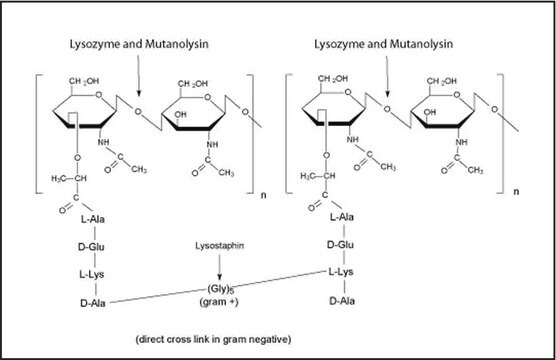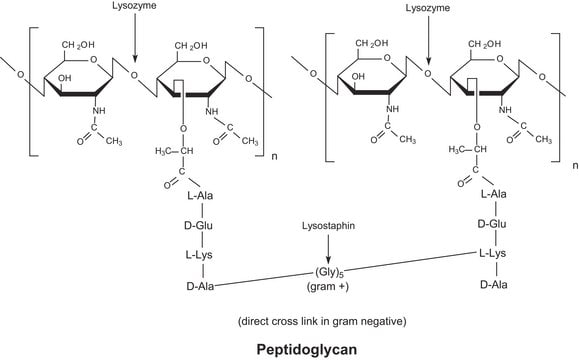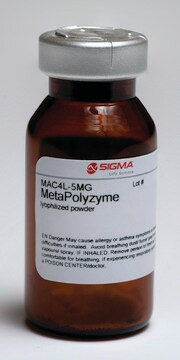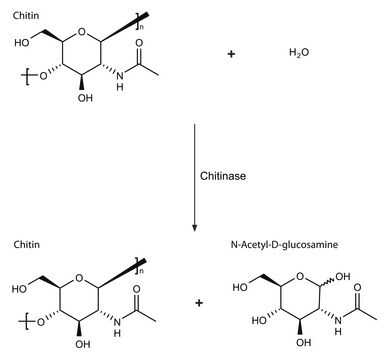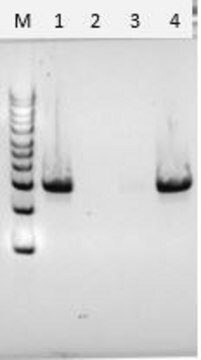SAE0196
Achromopeptidase from bacteria
free of DNA contaminants, suitable for Microbiome research
Autenticatiper visualizzare i prezzi riservati alla tua organizzazione & contrattuali
About This Item
Codice UNSPSC:
12352204
Prodotti consigliati
Origine biologica
bacterial
Livello qualitativo
Stato
lyophilized powder
Attività specifica
≥1000 U/mg
Caratteristiche
DNA free
tecniche
DNA extraction: suitable
Compatibilità
suitable for cell lysis
applicazioni
cell analysis
Condizioni di spedizione
ambient
Temperatura di conservazione
−20°C
Categorie correlate
Descrizione generale
Achromopeptidase is useful for lysis of Gram-positive bacteria that are resistant to lysozyme, as well as Gram-negative organisms. Achromopeptidase has been shown to contain two bacteriolytic proteases. This product is free of detectable microbial DNA and is suitable for microbiome research
Applicazioni
Achromopeptidase is useful for lysis of Gram-positive bacteria that are resistant to lysozyme, as well as Gram-negative organisms. Achromopeptidase has been shown to contain two bacteriolytic proteases.
The study of microbial communities has been revolutionized in recent years by the widespread adoption of culture independent analytical techniques such as 16S rRNA gene sequencing and metagenomics. Since DNA contamination during sample preparation is a major problem of these sequence-based approaches, DNA extraction reagents free of DNA contaminants are essential. This product undergoes strict quality control testing to ensure the absence of detectable levels of contaminating microbial DNA using 35 cycles PCR amplification of 16S and 18S rDNA using universal primer sets.
The study of microbial communities has been revolutionized in recent years by the widespread adoption of culture independent analytical techniques such as 16S rRNA gene sequencing and metagenomics. Since DNA contamination during sample preparation is a major problem of these sequence-based approaches, DNA extraction reagents free of DNA contaminants are essential. This product undergoes strict quality control testing to ensure the absence of detectable levels of contaminating microbial DNA using 35 cycles PCR amplification of 16S and 18S rDNA using universal primer sets.
Azioni biochim/fisiol
Achromopeptidase is a lysyl endopeptidase that has a molecular weight of approximately 27 kDa. Optimum pH is 8.5-9.
Caratteristiche e vantaggi
Contains two bacteriolytic proteases for efficient lysis of Gram-positive bacteria and Gram-negative organisms
Free of detectable microbial DNA, ensuring the accuracy of metagenomics and other culture-independent sequencing methods
Undergoes strict quality control testing to ensure the absence of detectable levels of contaminating microbial DNA
Optimum pH of 8.5-9 allows for use in a wide range of microbiome studies
Free of detectable microbial DNA, ensuring the accuracy of metagenomics and other culture-independent sequencing methods
Undergoes strict quality control testing to ensure the absence of detectable levels of contaminating microbial DNA
Optimum pH of 8.5-9 allows for use in a wide range of microbiome studies
Definizione di unità
One unit will produce a change in A600 of 0.001 per minute per mL at pH 8.0 at 37 °C using a suspension of Micrococcus lysodeikticus as substrate (1 cm light path).
Avvertenze
Danger
Indicazioni di pericolo
Consigli di prudenza
Classi di pericolo
Resp. Sens. 1
Codice della classe di stoccaggio
11 - Combustible Solids
Classe di pericolosità dell'acqua (WGK)
WGK 3
Punto d’infiammabilità (°F)
Not applicable
Punto d’infiammabilità (°C)
Not applicable
Scegli una delle versioni più recenti:
Certificati d'analisi (COA)
Lot/Batch Number
It looks like we've run into a problem, but you can still download Certificates of Analysis from our Documenti section.
Se ti serve aiuto, non esitare a contattarci Servizio Clienti
Possiedi già questo prodotto?
I documenti relativi ai prodotti acquistati recentemente sono disponibili nell’Archivio dei documenti.
Il team dei nostri ricercatori vanta grande esperienza in tutte le aree della ricerca quali Life Science, scienza dei materiali, sintesi chimica, cromatografia, discipline analitiche, ecc..
Contatta l'Assistenza Tecnica.